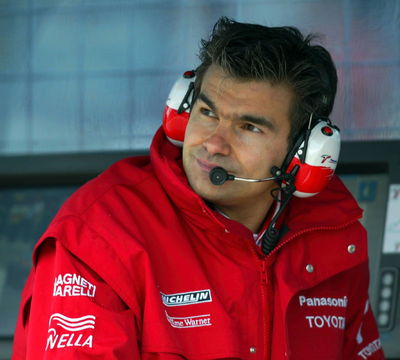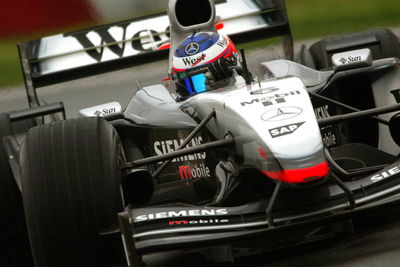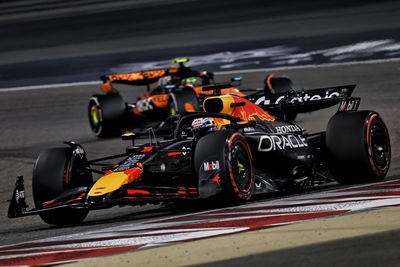Q&A: Dieter Gass - chief race engineer, Toyota.
German Dieter Gass has a vast array of motorsport experience after spending time in Le Mans, Touring Cars and other manufacturer categories.
The 40-year-old has been with Toyota Motorsport since 2001, when he joined as a test engineer, as the team conducted extensive F1 testing with its TF101 test car at 11 Grands Prix circuits worldwide.

German Dieter Gass has a vast array of motorsport experience after spending time in Le Mans, Touring Cars and other manufacturer categories.
The 40-year-old has been with Toyota Motorsport since 2001, when he joined as a test engineer, as the team conducted extensive F1 testing with its TF101 test car at 11 Grands Prix circuits worldwide.
In 2002, as Panasonic Toyota Racing made its debut in the FIA Formula 1 World Championship, Gass stepped up to become a race engineer for car number 25 - Allan McNish's TF102. In 2003, his role as chief race engineer sees him further his involvement in the team's on-track activities during race weekend. Here he talks about that role and a lot, lot more...
Q:
Can you explain your role and responsibilities within the Panasonic Toyota Racing team?
Dieter Gass:
As chief race engineer, one of my main responsibilities before qualifying is to make sure that we have information exchange between the two cars. Also, to keep an overview on what we are doing to them, see that it is done properly and make sure we don't go in the wrong direction. Once qualifying has started, the biggest thing is the strategy for the weekend, which is fixed before Saturday's qualifying hour this season as a result of the new rules.
Q:
So you are heavily involved in planning the race strategy?
DG:
Yes I am involved in developing the race strategy. You have to find a good compromise between qualifying performance, which means starting fuel level, and race performance, which means how you do your pit stops. Last year you almost always went for the theoretical best strategy and this year you have to take into account your qualifying fuel level, so it's all about finding the right compromise. Therefore, the tyre behaviour is crucial. If you have different tyre degradation, your strategy changes completely.
Q:
You have experience in sports and touring cars. How does F1 differ?
DG:
The biggest difference between sports cars, touring cars and F1 comes from the tyres. The tyre influence in F1 is much bigger. Because of the dimensions they are effectively another suspension element that we have to consider.
Q:
Have the new regulations and time constraints changed the way you work?
DG:
The new regulations for this year have indeed changed our approach quite a lot. There are two main points. Firstly, Cristiano [da Matta] is a new driver and I think it's much more difficult for a new driver in F1 this year than it was before. You have only one hour before first qualifying in which to learn the track well enough to qualify in the afternoon - that's a challenge. Secondly, the time you have to set-up the car and how you do it on Friday and Saturday has changed completely.
Q:
You said that tyres are crucial. To assess them you have to push hard, but that is tricky with just one hour of practice on Friday morning. How do you get around that?
DG:
It is difficult to get around the fact that we have just 60 minutes in which to evaluate the Michelin tyres for the weekend. Experience has shown that you can almost forget about getting valuable tyre information on Friday. If you don't have a very big difference in the tyres you end up doing it again during the 90 minutes of free practice on Saturday morning. You simply have to choose your Friday qualifying tyre on Friday and then the race tyre on Saturday.
Q:
How long does a good working relationship with a driver take?
DG:
It's not so difficult to develop a good working relationship with a driver. We did a lot of testing during the winter and by the start of the season I would say we had the relationship that we needed. When Cristiano started I was working directly with him after being Allan McNish's race engineer last year. Obviously, if you work for a long time with one driver you have to get used to another and learn about his comments. It takes some time to adapt.
Q:
Do drivers generally differ a great deal in their approach?
DG:
Yes, drivers do vary in terms of their approach. If you talk about the problems, you have drivers that give very analytical comments and others that are more emotional. You have to learn how to react. They might talk about huge oversteer for example, but you make a small step and the car is okay. You have to learn about their characters. Both Olivier [Panis] and Cristiano work very well together as a driver pairing, and I have a very good working relationship with both of them.
Q:
Do you find that drivers with experience are easier to work with, or are they more set in their ways?
DG:
A bit of both actually. To a certain degree more experienced guys know what they want and they struggle less with set-up, however the less experienced driver is actually quite good for an engineer because you can have more influence over the approach to a timed session during a race weekend.
Q:
Have you any instances where engineering decisions have been key?
DG:
It is more likely that engineering decisions can be critical this year, for example, when you take a quick decision on calling in the cars for pit stops and changing strategy. We had a couple of situations in Barcelona, for example, where we tried to avoid the traffic and managed it. But there have been other situations where we reacted quite well at a given moment, like swapping Olivier to a one-stop race in Austria, but never got to see what could have developed because the car unfortunately retired from the race.
Q:
Is the team's relative lack of F1 experience a big hindrance?
DG:
I would say that as a team we continue to learn lots from race weekends and we are still relatively inexperienced in F1, but it is not a big hindrance. The second year in F1 has traditionally been more difficult than the first. In year one you go to a circuit and you are completely without any reference - you just look into the race and gain as much data as you possibly can. This year, although we have last year's experience and data, it is not simply a case of copying and pasting last year's information onto this year's car. The TF103 is a very different car to its predecessor, so we have to adapt the new car to the circuits and try to find the optimum set-up in the pre-qualifying free practice sessions.
Q:
On a more personal note, what do you do in your spare time?
DG:
To be honest, I have very limited free time, but I try to do some running, when I can. I don't have time to compete but I did do a couple of marathons in 1999. I also enjoy going to the cinema, and other sports, like handball and squash.
Q:
Have you ever done any racing yourself?
DG:
Yes, I drove in the Renault Clio championship back in the early 1990's and actually managed to win the German championship.











